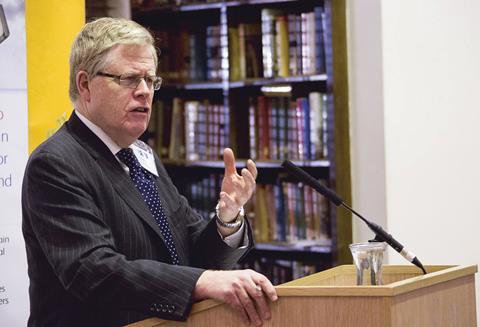Just inside the doorway of Lord Justice Jackson’s roomy, booklined office in the heart of the Royal Courts of Justice, seven huge plastic crates are stacked incongruously. He is moving out.

Jackson’s departure from the RCJ marks the end of an era. In the spring of 2008, the judge was approached by then master of the rolls Anthony Clarke with what was effectively good news and bad news: he was to be promoted to the Court of Appeal, and was being handed the brief of tackling civil litigation costs.
That task, pitched as a one-year job, has dominated the past 10 years of Jackson’s life.
‘Whoever received that poisoned chalice was bound to make themselves extremely unpopular,’ he remarks. ‘Unless they ducked the issue and just issued platitudes about the desirability of motherhood and apple pie or whatever.’
Platitudes are certainly not Jackson’s style. He threw himself into the costs review, and the final report he delivered to the master of the rolls in December 2009 was the product of many hours of engagement with litigation stakeholders, and many late nights spent scrutinising every issue from every angle. His final conclusions made him every bit as popular as he knew they would.
Aside from one 18-month period of illness, Jackson has kept a bulldog-like grip on his reforms throughout. Ahead of their introduction, he was heavily involved in drafting the relevant rules and practice directions. Once the reforms were in force, he was quick to point out where things were going off-track.
‘Having been given this job 10 years ago, I really did want to see it through,’ he says. ‘And I thought seeing it through involved not just writing a report, but helping with implementation. Then after implementation keeping a sharp eye on what was happening and speaking out when things were going wrong… And by and large what I said publicly had the desired effect.’
One of Jackson’s most dramatic speeches was his call in January 2016 for a radical extension of fixed costs to all civil cases worth up to £250,000. The lecture, given against a backdrop of vocal criticism by the legal profession of the costs budgeting process, was even accompanied by a menacing grid of suggested fee levels.
By July last year, however, when the judge published the results of his official review of the extension of fixed costs, the proposed case value had dropped to a more palatable £100,000. Funnily enough, Jackson had received feedback from the profession that costs budgeting was now working much better, making the higher level of fixed costs unnecessary.
‘I was pleased to note that costs management was working rather better and I took that into account in deciding to rein in my original proposals for fixed costs,’ he says. ‘It may be that that lecture, although it caused an uproar at the time, may have smoothed the way somewhat. Who knows?’ he adds with a wry smile.
As he prepares to pack away his papers, Jackson is conducting his own frank assessment of the success or otherwise of his reforms. Many of the low-key changes, such as provisional assessment, hot-tubbing and case management, have quietly achieved good results. He says: ‘Most of the case management reforms are working well, and people have quite reasonably forgotten they are part of the Jackson reforms.’
He adds good-humouredly: ‘The fate of any civil justice reformer is that when their reforms work well, the fact that they were responsible for the reforms is forgotten instantly. Where people are displeased with the reforms, they are held personally to account.’
Turning to the more controversial areas, Jackson notes that while ‘a lot of people predicted that ending recoverable success fees would be the end of the world’, figures show that the reform has clearly succeeded. He regrets, however, that one of the intended ‘counterweights’ for claimants – the introduction of damages-based agreements – has not succeeded. This has in part been down to the Ministry of Justice’s decision not to allow a hybrid option, which Jackson considers irrational; as well as the continued existence of the indemnity rule, which Jackson would prefer to see abolished.

Jackson is acutely aware of the criticism that has been levelled at his new proportionality rule, with practitioners concerned by the lack of guidance on how it should operate. But he believes it has operated fairly. ‘Among all the criticisms of the reforms, no one has suggested any improvement to that wording,’ he argues. ‘It occupied me for hours and hours and days and days, and I had been through a lot of different drafts… The rule captures the essential factors for determining what costs are proportionate.’
He adds: ‘What needs to happen is a group of appeals where one or other party is dissatisfied with the assessment of costs to come up collectively to the Court of Appeal, presided over by the MR or a senior judge, where the court can give guidance on the rule… I would dearly like to see all going well on this front. But I accept that the lack of any Court of Appeal guidance in a cluster of these cases is a drawback.’
The judge notes that the recent BNM judgment, in which the Court of Appeal had been expected to comment on the new rule, ‘didn’t turn on that point’ in the end.
What next for Sir Rupert? With his fixed costs reforms still languishing in the government’s in-tray, he is reluctant to leave his big job unfinished; but is compelled to retire as he turns 70 on Wednesday. He will rejoin his old chambers, now at 4 New Square, as arbitrator and adjudicator, and also join the new commercial court in Kazakhstan headed by Lord Woolf.
‘It takes me out of the picture just when the last phase of my reforms is under consideration,’ he grimaces. ‘But since I am required to retire on age grounds, I shall work elsewhere.’
A longer interview with Lord Justice Jackson will be published in April’s Litigation Funding.
Rachel Rothwell is editor of Gazette sister magazine Litigation Funding































6 Readers' comments